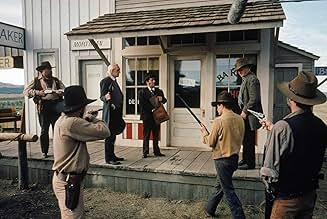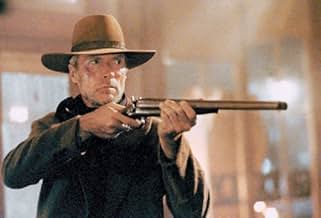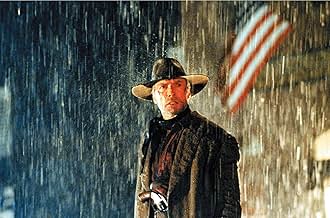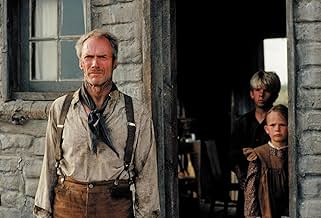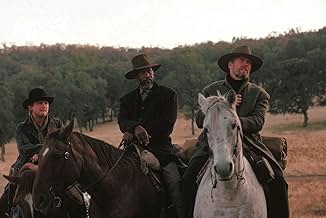El pistolero del viejo oeste William Munny acepta a regañadientes un último trabajo con ayuda de su viejo compañero y de un joven.El pistolero del viejo oeste William Munny acepta a regañadientes un último trabajo con ayuda de su viejo compañero y de un joven.El pistolero del viejo oeste William Munny acepta a regañadientes un último trabajo con ayuda de su viejo compañero y de un joven.
- Ganó 4 premios Óscar
- 52 premios ganados y 47 nominaciones en total
Tara Frederick
- Little Sue
- (as Tara Dawn Frederick)
Shane Thomas Meier
- Will Munny
- (as Shane Meier)
- Dirección
- Guionista
- Todo el elenco y el equipo
- Producción, taquilla y más en IMDbPro
Resumen
Reviewers say 'Unforgiven' is celebrated for its intricate themes of morality, violence, and redemption, redefining Western genre conventions. Clint Eastwood's direction and performance receive high praise, as do Morgan Freeman and Gene Hackman's supporting roles. The film's examination of violence's human toll and moral ambiguity is noted. Some find it slow and emotionally distant, while others hail it as a masterpiece.
Opiniones destacadas
I enjoy the transformation of Clint Eastwood's character throughout the movie. In the beginning he reluctantly becomes a gunfighter but as the movie progresses you see how he slides down the slippery slope of wickedness to become the cold-blooded killer needed for the task. Morgan Freeman's reaction to the transformation is well played also. Richard Harris' character is colorful as is his sidekick. Gene Hackman's sheriff is pleasantly atypical of the role. All these actors and their characters effectively leave the viewer with a myriad of directions from which the movie expertly entertains. If you are expecting anything like Clint's "spaghetti westerns" you will be disappointed. If you are looking for an excellent story with characters that all have varying degrees of wickedness, you will be satisfied when its all said and done.
Clint Eastwood's storytelling gives the western genre one of its most sublime story's. Gone is the trademark mysterious hero and in its place is an ex gunman who made his peace when he met his wife. Eastwood has transcended traditional entertainment to storytelling craftsmanship. He delivers rich characters with deep rooted problems inextricably linked to the villains of the story. Refusing to wither and die away, style has been perfectly adapted with age thus ensuring his maturation into a true Hollywood legend.
Besides his now distinctive storytelling, there are numerous factors that make this a landmark Western. The ensemble cast could not have been stronger and there were no weak performances. The soundtrack accentuates the intended atmosphere of the director. A single detracting factor I could find only just qualifies as such. Munny's whimsical lines seemed a little contrived at times. They droned on like pale attempts to capture the Western era. But this is a consequence of the fact that they were more to do with the character of William Munny. He is after all a reformed killer with a now passive approach to people. Given this fact and also that it may have been distracting since it was so out of sync with what we are used to seeing from Eastwood, I still have to list it as a demerit on the account it slightly jerked me out of the story.
Hollywood producers have to satisfy audience preferences if investments are going to accrue profits. It is the nature of the beast. The action and more specifically the Western genre will stick to tried and tested formulas in order to guarantee audience acceptance. But every so often you get people who as a natural consequence of their unique character appeal are able to deliver a story that is outside these understandably restrictive boundaries. Eastwood is a cool individualist who normally plays characters who are not team players and do it their own way. His own way this time is to give the western genre a real story oozing characterization. A sort of ballad for the bad guy.
The ballads tune provides the story with a sad, introspective mood, within the opening and closing scenes. The opening scene depicts Munny in his new found life. He is cured of his wicked ways, helped by his dear, departed wife. But men are not willing to forgive or forget his monstrous deeds and in the final scenes he is who he has to be. Such is the sorrowful life of William Munny.
Westerns are typified by clearly defined goodies and baddies, but this is definitely not the case here. Eastwood and Freeman play reformed killers who find circumstances drawing them once again to their evil ways. But the older and wiser men now realize the value of life and come face to face with their troubled consciences. This is unlike their naïve, young partner who is attracted to the bravado image of the killer and relishes taking a man's life. This moral issue is virtually taboo for the classic western which glamorizes the lawlessness and the hero attraction of the gunslinger. This is also why in my view no-one besides Eastwood should have handled this movie.
Then we have the juiciest character of the movie superbly played by Gene Hackman worthy of the weight of every micro granule of his Oscar. He is the epitome of every hard-line lawman that ever was. The misguidance of the so called righteously empowered, swinging the hammer against evil for good. Hackman must have salivated when he read the script since there was obvious relish in his performance. All the better for the movie, and of course for Eastwood at the Oscars. By far the best performance and the others were good further underlining the talent of the man.
The antagonist of the movie is almost always the most complex and thus most interesting to analyze. His vain attempts at carpentry are his way of trying to appear to be a good man. There is purity in building ones own home and it is this wholesomeness that he wishes to capture. In that way his fellow citizens will see him as a simple man only wanting to lead a righteous life. But his inability as a carpenter is indicative of his depravity. He cannot be a good man. The source of his drive is anger and hatred. It is through this failing that we realize he cannot escape who he is.
Indeed it was not only the power of the script that gave the audience a spellbinding climax, but the talents of the actors. The actors' characterizations deliver the audience a spellbinding climax. It is only through Hackman's performance that we not only acknowledge his ending as inevitable, but also as deserving. We saw him as a man who virtually thought that he was righteously empowered to rid the earth of Munny and his kind What he thought was an honorable task was one rather of abuse and suppression. He became the baddie in the eyes of the audience and it is he who the audience wants to see justice served upon.
Munny was so weak throughout the movie that the eruption of his evil ways captured the interest of the audience. He transformed into the Eastwood of old the anti hero with a far more malevolent presence. Never could we have sensed this hatred and evil that we now see in William Munny. It is now that the frivolity of his mannerisms that I touched on in the beginning adds to the story as it helps to accentuate the turn in character. He is now only a killer, in it neither for money or fame as the writer nearly finds out to his tragic detriment.
Those who have only seen his Westerns of old or the 'Dirty Harry' movies may enter the cinema with expectations of such like will either be disappointed or pleasantly surprised. It is the atypical western and an unfamiliar portrayal by Eastwood. But I believe that most people will have the latter reaction. The differences are their strengths helped by the fact that it was a superbly crafted movie with a meaningful story and thought provoking lessons for our heroes and villains. Eastwood was directly suited to the roles that we identify him with, but it is exactly because of this suitability that he eases into the role of Munny. No mellowing with age, no identification with the mainstream, he has always done it his way, and he is so good that any way could be his way.
Besides his now distinctive storytelling, there are numerous factors that make this a landmark Western. The ensemble cast could not have been stronger and there were no weak performances. The soundtrack accentuates the intended atmosphere of the director. A single detracting factor I could find only just qualifies as such. Munny's whimsical lines seemed a little contrived at times. They droned on like pale attempts to capture the Western era. But this is a consequence of the fact that they were more to do with the character of William Munny. He is after all a reformed killer with a now passive approach to people. Given this fact and also that it may have been distracting since it was so out of sync with what we are used to seeing from Eastwood, I still have to list it as a demerit on the account it slightly jerked me out of the story.
Hollywood producers have to satisfy audience preferences if investments are going to accrue profits. It is the nature of the beast. The action and more specifically the Western genre will stick to tried and tested formulas in order to guarantee audience acceptance. But every so often you get people who as a natural consequence of their unique character appeal are able to deliver a story that is outside these understandably restrictive boundaries. Eastwood is a cool individualist who normally plays characters who are not team players and do it their own way. His own way this time is to give the western genre a real story oozing characterization. A sort of ballad for the bad guy.
The ballads tune provides the story with a sad, introspective mood, within the opening and closing scenes. The opening scene depicts Munny in his new found life. He is cured of his wicked ways, helped by his dear, departed wife. But men are not willing to forgive or forget his monstrous deeds and in the final scenes he is who he has to be. Such is the sorrowful life of William Munny.
Westerns are typified by clearly defined goodies and baddies, but this is definitely not the case here. Eastwood and Freeman play reformed killers who find circumstances drawing them once again to their evil ways. But the older and wiser men now realize the value of life and come face to face with their troubled consciences. This is unlike their naïve, young partner who is attracted to the bravado image of the killer and relishes taking a man's life. This moral issue is virtually taboo for the classic western which glamorizes the lawlessness and the hero attraction of the gunslinger. This is also why in my view no-one besides Eastwood should have handled this movie.
Then we have the juiciest character of the movie superbly played by Gene Hackman worthy of the weight of every micro granule of his Oscar. He is the epitome of every hard-line lawman that ever was. The misguidance of the so called righteously empowered, swinging the hammer against evil for good. Hackman must have salivated when he read the script since there was obvious relish in his performance. All the better for the movie, and of course for Eastwood at the Oscars. By far the best performance and the others were good further underlining the talent of the man.
The antagonist of the movie is almost always the most complex and thus most interesting to analyze. His vain attempts at carpentry are his way of trying to appear to be a good man. There is purity in building ones own home and it is this wholesomeness that he wishes to capture. In that way his fellow citizens will see him as a simple man only wanting to lead a righteous life. But his inability as a carpenter is indicative of his depravity. He cannot be a good man. The source of his drive is anger and hatred. It is through this failing that we realize he cannot escape who he is.
Indeed it was not only the power of the script that gave the audience a spellbinding climax, but the talents of the actors. The actors' characterizations deliver the audience a spellbinding climax. It is only through Hackman's performance that we not only acknowledge his ending as inevitable, but also as deserving. We saw him as a man who virtually thought that he was righteously empowered to rid the earth of Munny and his kind What he thought was an honorable task was one rather of abuse and suppression. He became the baddie in the eyes of the audience and it is he who the audience wants to see justice served upon.
Munny was so weak throughout the movie that the eruption of his evil ways captured the interest of the audience. He transformed into the Eastwood of old the anti hero with a far more malevolent presence. Never could we have sensed this hatred and evil that we now see in William Munny. It is now that the frivolity of his mannerisms that I touched on in the beginning adds to the story as it helps to accentuate the turn in character. He is now only a killer, in it neither for money or fame as the writer nearly finds out to his tragic detriment.
Those who have only seen his Westerns of old or the 'Dirty Harry' movies may enter the cinema with expectations of such like will either be disappointed or pleasantly surprised. It is the atypical western and an unfamiliar portrayal by Eastwood. But I believe that most people will have the latter reaction. The differences are their strengths helped by the fact that it was a superbly crafted movie with a meaningful story and thought provoking lessons for our heroes and villains. Eastwood was directly suited to the roles that we identify him with, but it is exactly because of this suitability that he eases into the role of Munny. No mellowing with age, no identification with the mainstream, he has always done it his way, and he is so good that any way could be his way.
Unforgiven is about as far from the fantasy mythos of A Fistful of Dollars as Clint Eastwood could get. No pin-point accuracy with 19th century technology, no desire to 'play fair' and face the enemy on even terms. If you can shoot him in the back...then do it.
Eastwood puts in an astonishing performance as the retired killer Muny, saved from his life of thievery and murder by his late wife. Now, desperately trying to support his children with no income, he is tempted back to his killing ways by the bounty offered by the women of a brothel, one of whom's number has been savagely beaten and disfigured by a drunken ranch-hand.
The film follows Eastwood as he wrestles with his desire to honour his wife's memory and his need to feed his children by returning to the killer that, he fears, is his true nature. Meanwhile word of the bounty has spread and the events spiral out of control as the sheriff (Gene Hackman) deals with the guns for hire that ride into town.
While all the supporting cast are excellent Gene Hackman's Oscar winning performance even manages to eclipse Eastwoods as the brutal Sheriff. He beats one of the bounty hunters, English Bob (Richard Harris) almost to death and then explains to a journalist, in one of the film's stand out scenes, how men like he and Muny are so successful at killing. The mood moves from light banter to life threatening seriousness...and back again, with just one move of his head.
One of the greatest Westerns ever made? Certainly. Although the fact it's a western is really secondary. In truth it's a tale of the nature of evil and the nature of man. Eastwood uses the gap between the western myth and reality as an arena to play out his story and does so with consummate style.
Eastwood puts in an astonishing performance as the retired killer Muny, saved from his life of thievery and murder by his late wife. Now, desperately trying to support his children with no income, he is tempted back to his killing ways by the bounty offered by the women of a brothel, one of whom's number has been savagely beaten and disfigured by a drunken ranch-hand.
The film follows Eastwood as he wrestles with his desire to honour his wife's memory and his need to feed his children by returning to the killer that, he fears, is his true nature. Meanwhile word of the bounty has spread and the events spiral out of control as the sheriff (Gene Hackman) deals with the guns for hire that ride into town.
While all the supporting cast are excellent Gene Hackman's Oscar winning performance even manages to eclipse Eastwoods as the brutal Sheriff. He beats one of the bounty hunters, English Bob (Richard Harris) almost to death and then explains to a journalist, in one of the film's stand out scenes, how men like he and Muny are so successful at killing. The mood moves from light banter to life threatening seriousness...and back again, with just one move of his head.
One of the greatest Westerns ever made? Certainly. Although the fact it's a western is really secondary. In truth it's a tale of the nature of evil and the nature of man. Eastwood uses the gap between the western myth and reality as an arena to play out his story and does so with consummate style.
William Munny (Clint Eastwood taking the lead and directing the piece) is an old and retired gunman whose past misdemeanours would make the devil himself seem tame. Widowed and struggling to raise his two children on a paltry farm, he's tempted out of retirement for one last pay dirt job, the consequence of which provides violence - both physically and of the soul.
Clint Eastwood signed off from the Western genre with this magnificent 1992 picture, the appropriation and irony of which is in itself a majestic point of reference. After the script had been knocking around for nigh on twenty years (written by Blade Runner scribe David Webb Peoples), Eastwood seized the opportunity to play William Munney and lay bare the mythologies of the Wild West.
It's striking that the makers here have lured us in to being firmly on Munney's side, we are, incredibly, influenced by Eastwood's part in the history of the Western. In spite of Munney's obvious murky past (despicable crimes they be), we wait (and hope) for Munney to make a quip and way lay the bad guys - in fact salivating at the prospect is probably closer to the truth. So it's with enormous credit that Eastwood, and his magnificent cast and crew, manage to fuddle all our respective perceptions of the West and the characters we ourselves have aged with.
It's not for nothing that W.W. Beauchamp (Saul Rubinek) is one of the critical characters on show, this even though we didn't expect that to be the case. Beauchamp is a writer of penny pulpy novels that tell of derring-do heroics, gunslingers with a glint in their eye who deal death as some sort of heroic encore. This gives Unforgiven an excellent sleight of hand, for this West is grim and a destroyer of all illusions and it's not controversial to say that this is indeed a good thing.
Eastwood is greatly served by the actors around him, Morgan Freeman, Gene Hackman (winning the Best Supporting Actor Oscar for a script he turned down many years before!), Rubinek, Frances Fisher, Anna Thomson, Jaimz Woolvett and an incredible cameo from Richard Harris. Along with Hackman's win for his brutally tough portrayal of Sheriff "Little Bill" Daggett, Unforgiven also won Oscars for Eastwood for his clinically tight direction, Best Picture, Best Editing and it was nominated in another five categories. One of those nominations was for Jack Green's cinematography, which now, in this age of High Definition enhanced cinema, can be seen in all its wonderful glory. The Alberta location is magically transformed into the Western frontier, with the orange and brown hues a real treat for the eyes.
Ultimately though, Unforgiven is a lesson in adroit film making, where across the board it works so well. Why? Well because the man at the helm knows this genre inside out, he was after all the sole flag bearer for practically 25 years. He learnt from his peers, and thus Eastwood has crafted a thematically complex piece that for all its violence, debunking and melancholy pulse beats, is a film that is as beautiful as it is most assuredly stark. An incredible and true highlight of modern day cinema, regardless of being a genre fan or not. 10/10
Clint Eastwood signed off from the Western genre with this magnificent 1992 picture, the appropriation and irony of which is in itself a majestic point of reference. After the script had been knocking around for nigh on twenty years (written by Blade Runner scribe David Webb Peoples), Eastwood seized the opportunity to play William Munney and lay bare the mythologies of the Wild West.
It's striking that the makers here have lured us in to being firmly on Munney's side, we are, incredibly, influenced by Eastwood's part in the history of the Western. In spite of Munney's obvious murky past (despicable crimes they be), we wait (and hope) for Munney to make a quip and way lay the bad guys - in fact salivating at the prospect is probably closer to the truth. So it's with enormous credit that Eastwood, and his magnificent cast and crew, manage to fuddle all our respective perceptions of the West and the characters we ourselves have aged with.
It's not for nothing that W.W. Beauchamp (Saul Rubinek) is one of the critical characters on show, this even though we didn't expect that to be the case. Beauchamp is a writer of penny pulpy novels that tell of derring-do heroics, gunslingers with a glint in their eye who deal death as some sort of heroic encore. This gives Unforgiven an excellent sleight of hand, for this West is grim and a destroyer of all illusions and it's not controversial to say that this is indeed a good thing.
Eastwood is greatly served by the actors around him, Morgan Freeman, Gene Hackman (winning the Best Supporting Actor Oscar for a script he turned down many years before!), Rubinek, Frances Fisher, Anna Thomson, Jaimz Woolvett and an incredible cameo from Richard Harris. Along with Hackman's win for his brutally tough portrayal of Sheriff "Little Bill" Daggett, Unforgiven also won Oscars for Eastwood for his clinically tight direction, Best Picture, Best Editing and it was nominated in another five categories. One of those nominations was for Jack Green's cinematography, which now, in this age of High Definition enhanced cinema, can be seen in all its wonderful glory. The Alberta location is magically transformed into the Western frontier, with the orange and brown hues a real treat for the eyes.
Ultimately though, Unforgiven is a lesson in adroit film making, where across the board it works so well. Why? Well because the man at the helm knows this genre inside out, he was after all the sole flag bearer for practically 25 years. He learnt from his peers, and thus Eastwood has crafted a thematically complex piece that for all its violence, debunking and melancholy pulse beats, is a film that is as beautiful as it is most assuredly stark. An incredible and true highlight of modern day cinema, regardless of being a genre fan or not. 10/10
This is the antithesis to the cocky characters of his career and yet it's the crowning achievement to a 35 year long (now it's been 65 years!) career as one of the all time great A-listers. Second only to John Wayne as the longest A-Lister to be on the A-list (although Tom Cruise just broke both of their records), Clint Eastwood was the man with no name. He didn't want to come to your town. You forced him to. He didn't want to be the hero. It was forced upon him. Same in this movie. He's got one last hurrah in his Western lore and if you're new to Clint Eastwood, watch how it's done in all its glory!
Oscars Best Picture Winners, Ranked
Oscars Best Picture Winners, Ranked
See the complete list of Oscars Best Picture winners, ranked by IMDb ratings.
¿Sabías que…?
- TriviaDirector Clint Eastwood dedicated the film to directors and mentors Sergio Leone and Don Siegel. The final screen credit reads, "Dedicated to Sergio and Don."
- ErroresEnglish Bob says that no assassin would dare hold a gun to a monarch. There were, in fact, six assassination attempts made against Queen Victoria, and they were well known at the time. He certainly would have known about them. However, it should be noted that English Bob was mainly saying this to antagonize people and not necessarily because he truly believed it.
- Citas
Little Bill Daggett: You'd be William Munny out of Missouri. Killer of women and children.
Will Munny: That's right. I've killed women and children. I've killed just about everything that walks or crawled at one time or another. And I'm here to kill you, Little Bill, for what you did to Ned.
- Créditos curiososAt the end of the credits, there is caption reading, "Dedicated to Sergio and Don". This is a reference to late directors Sergio Leone (who directed Clint Eastwood in the Dollars trilogy) and Don Siegel (who directed Eastwood in Dirty Harry and Escape from Alcatraz).
- Versiones alternativasThe end credits in the current TV prints contain a black screen in addition the 2018 Warner Bros. Pictures plaster.
- ConexionesFeatured in Clint Eastwood on Westerns (1992)
Selecciones populares
Inicia sesión para calificar y agrega a la lista de videos para obtener recomendaciones personalizadas
Detalles
Taquilla
- Presupuesto
- USD 14,400,000 (estimado)
- Total en EE. UU. y Canadá
- USD 101,167,799
- Fin de semana de estreno en EE. UU. y Canadá
- USD 15,018,007
- 9 ago 1992
- Total a nivel mundial
- USD 159,167,799
- Tiempo de ejecución2 horas 10 minutos
- Color
- Relación de aspecto
- 2.39 : 1
Contribuir a esta página
Sugiere una edición o agrega el contenido que falta

Principales brechas de datos
What is the streaming release date of Los imperdonables (1992) in Mexico?
Responda




